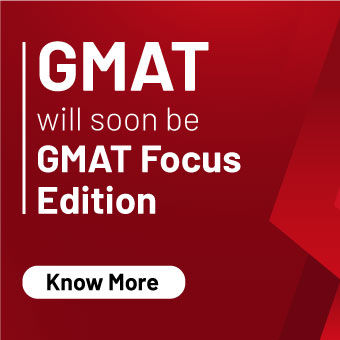
GMAT Exam
The Graduate Management Admission Test, or GMAT, is mainly taken by MBA students who want to study abroad. This exam assesses students’ Integrated Reasoning skills, Quantitative skills, Verbal skills, and Analytical Writing Assessment. This exam’s intriguing structure and pattern make it both challenging and enjoyable.
Because of the course format of this exam, prospective students are frequently confused as to which exam will better fulfill their MBA requirements: GMAT or GRE. It is critical for them to understand that the GMAT score is used by recognized business schools throughout the world to analyze a candidate’s profile and finalize their admission.
Now, let’s talk about that what is the Eligibility Criteria for the GMAT.
GMAT Eligibility Criteria 2024
As per GMAC, the governing body for the GMAT, there are no specific GMAT exam eligibility criteria. However, before applying to any college or university it is suggested to check what all your college or university demands.
Age Criteria and Qualifications Required for the GMAT
The candidate must have completed 18 years of age; however, there is no upper age limit for the candidate applying to take the test and if you are a student falling between the age group of 13 to 17 years, you should have permission in writing from your parents or from your legal guardian.
As per GMAC, there is no such qualification you need to have in order to appear for the GMAT test.
Nationality Required for the GMAT
There are no boundaries to the nationality of a candidate. Anyone from any country can apply for the GMAT.
Check Your Score Now with a Free Practice Test
See where you stand with our practice tests. Find the right way to improve with our strategy sessions.
GMAT Exam Requirements
Candidates who intend to take the GMAT must prepare documents in advance in order to fill out the registration form.
- Name of the applicant, spelled correctly, as it appears on the passport
- Contact information
- Gender, ethnicity, date of birth, and citizenship are all examples of demographic data.
- Payment information
Work Experience
Every year, a large number of test takers with a minimum of 3-4 years of work experience register for the GMAT. Candidates with industrial experience are preferred by top business schools. Following the start of the application process, the admissions committee assesses the applicant’s job experience and how it relates to the future business environment.
Attempting Limit For GMAT
There are only a few prerequisites for taking the GMAT:
- Only 16 days after the scheduled date is it possible to retake the GMAT.
- A candidate is only allowed to take the GMAT five times a year.
- A test taker can only attempt the exam eight times in their lifetime.
- If an applicant receives the highest possible GMAT score, he or she must wait five years to repeat the exam.
- Each GMAT attempt requires the test taker to register.
Palm Vein Identification In GMAT
GMAC takes this precaution to prevent forgery during tests. Candidates must produce a palm vein impression as identification at the time of check-in. The palm vein reader biometric makes it impossible for someone to take the GMAT on someone else’s behalf. This step is being done to ensure that the exam is fair.
GMAT Reservation Criteria
For students with disabilities, special reservation criteria are in place. To be eligible under this provision, a candidate must meet the following criteria:
As a GMAT test taker, you must include all of the following information in your application:
- When compared to the majority of persons, the presence of an impairment significantly limits a key life activity.
- Your existing limitation and how it affects your ability to take the computer-adaptive GMAT exam under normal settings.
- A justification for why the accommodation is necessary and suitable in light of your disability.
GMAT Candidate Information
Candidates must give legal information such as their name, address, email address, phone number, gender, date of birth, citizenship country, government-issued identity, a digital photograph, signature, palm vein pattern, and so on.
Importance Of GMAT Eligibility Criteria
If you want to get into a prestigious MBA program, the GMAT eligibility criteria should be your first priority. GMAT eligibility is a common worry shared by practically all students seeking admission to targeted MBA programs. Following the verification of eligibility, test takers take the GMAT exam and score based on their preparation techniques. The GMAT exam evaluation is hardly a walk in the park because it is “computer adaptive” in nature. Candidates must work smart and examine the analytics of the GMAT as an aptitude assessment examination in addition to working hard to prepare for the test. GMAT test administrators use the concept of “Artificial Intelligence” to assess applicants who will change the business world.
Who Can Appear For The Test Under GMAT Eligibility?
Anyone who meets the basic requirements is eligible to take the GMAT. According to the official GMAT website, anyone from any academic background, nationality, religion, age, gender, or race is welcome to take the exam. There are also unique facilities available at the exam centers for applicants who are differently abled. For that, one must present medical certifications, which the GMAC keeps confidential.
It’s important to note that taking the GMAT isn’t required in order to attend a business school. Many universities, although not all, consider the exam to be a prerequisite for admission. For example, in France and many other countries, one can pursue an MBA without taking the GMAT.
Every year, more than 30,000 GMAT test-takers are reported in India. This exam, which is taken all over the world, raises a lot of questions in the minds of those who take it. One of the most commonly asked questions by GMAT applicants is if they are eligible for the exam. To address this concern, we have condensed the list of exam requirements as approved by the Graduate Management Admission Council (GMAC), the official authority that administers the GMAT exam.
According to a GMAC survey, the majority of Graduate Management Education graduates have positive opinions of their GME experience and consider their investment in GME as a positive return on investment.
- 87% of the graduates said that pursuing GME increased their employability
- 77% of them thought that their earning power has increased
- 76% thought pursuing GME prepared them for the leadership position
- 76% of the graduates developed a professional network
- 72% of the graduates thought that pursuing GME paid enough to support their desired lifestyle
- 70% of them said that GME prepared them for their chosen career
- 70 % of the graduates thought that GME prepared them to work in culturally diverse organizations
- 68% of the GME graduates said that it offered them opportunities for quicker career advancement
- 66% of them said that pursuing GME provided them a greater job security























